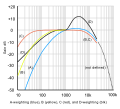Weighting
Weighting is a process used in data analysis and statistics to adjust the impact of different data points on a final result. It is often used when the data being analyzed is not evenly distributed or when certain data points are considered more important than others.
Overview[edit]
In statistics, weighting is used to adjust the contribution of different data points to a final result. This is often done when the data being analyzed is not evenly distributed or when certain data points are considered more important than others. For example, in a survey, responses from people in a certain age group might be given more weight if the survey is trying to understand the opinions of that age group.
Weighting can also be used in other fields, such as economics, psychology, and social sciences. In these fields, weighting can be used to adjust for biases in data collection or to give more importance to certain variables.
Types of Weighting[edit]
There are several types of weighting, including:
- Frequency weighting: This type of weighting is used when the frequency of a data point is important. For example, in a survey, if a certain response is given more frequently, it might be given more weight.
- Reliability weighting: This type of weighting is used when the reliability of a data point is important. For example, in a study, if a certain measurement is known to be more reliable, it might be given more weight.
- Importance weighting: This type of weighting is used when the importance of a data point is important. For example, in a decision-making process, if a certain factor is considered more important, it might be given more weight.
Applications[edit]
Weighting is used in a variety of fields and applications, including:
- Survey research: In survey research, weighting is often used to adjust for biases in the sample. For example, if a survey is conducted online, it might over-represent people who have internet access. To correct for this, responses from people without internet access might be given more weight.
- Economic modeling: In economic modeling, weighting is often used to give more importance to certain variables. For example, in a model of the economy, the impact of government spending might be given more weight than the impact of individual consumer spending.
- Psychological research: In psychological research, weighting is often used to adjust for the reliability of different measurements. For example, if a certain psychological test is known to be more reliable, it might be given more weight in a study.
See also[edit]
Ad. Transform your life with W8MD's Budget GLP-1 injections from $75


W8MD offers a medical weight loss program to lose weight in Philadelphia. Our physician-supervised medical weight loss provides:
- Weight loss injections in NYC (generic and brand names):
- Zepbound / Mounjaro, Wegovy / Ozempic, Saxenda
- Most insurances accepted or discounted self-pay rates. We will obtain insurance prior authorizations if needed.
- Generic GLP1 weight loss injections from $75 for the starting dose.
- Also offer prescription weight loss medications including Phentermine, Qsymia, Diethylpropion, Contrave etc.
NYC weight loss doctor appointmentsNYC weight loss doctor appointments
Start your NYC weight loss journey today at our NYC medical weight loss and Philadelphia medical weight loss clinics.
- Call 718-946-5500 to lose weight in NYC or for medical weight loss in Philadelphia 215-676-2334.
- Tags:NYC medical weight loss, Philadelphia lose weight Zepbound NYC, Budget GLP1 weight loss injections, Wegovy Philadelphia, Wegovy NYC, Philadelphia medical weight loss, Brookly weight loss and Wegovy NYC
|
WikiMD's Wellness Encyclopedia |
| Let Food Be Thy Medicine Medicine Thy Food - Hippocrates |
Medical Disclaimer: WikiMD is not a substitute for professional medical advice. The information on WikiMD is provided as an information resource only, may be incorrect, outdated or misleading, and is not to be used or relied on for any diagnostic or treatment purposes. Please consult your health care provider before making any healthcare decisions or for guidance about a specific medical condition. WikiMD expressly disclaims responsibility, and shall have no liability, for any damages, loss, injury, or liability whatsoever suffered as a result of your reliance on the information contained in this site. By visiting this site you agree to the foregoing terms and conditions, which may from time to time be changed or supplemented by WikiMD. If you do not agree to the foregoing terms and conditions, you should not enter or use this site. See full disclaimer.
Credits:Most images are courtesy of Wikimedia commons, and templates, categories Wikipedia, licensed under CC BY SA or similar.
Translate this page: - East Asian
中文,
日本,
한국어,
South Asian
हिन्दी,
தமிழ்,
తెలుగు,
Urdu,
ಕನ್ನಡ,
Southeast Asian
Indonesian,
Vietnamese,
Thai,
မြန်မာဘာသာ,
বাংলা
European
español,
Deutsch,
français,
Greek,
português do Brasil,
polski,
română,
русский,
Nederlands,
norsk,
svenska,
suomi,
Italian
Middle Eastern & African
عربى,
Turkish,
Persian,
Hebrew,
Afrikaans,
isiZulu,
Kiswahili,
Other
Bulgarian,
Hungarian,
Czech,
Swedish,
മലയാളം,
मराठी,
ਪੰਜਾਬੀ,
ગુજરાતી,
Portuguese,
Ukrainian







